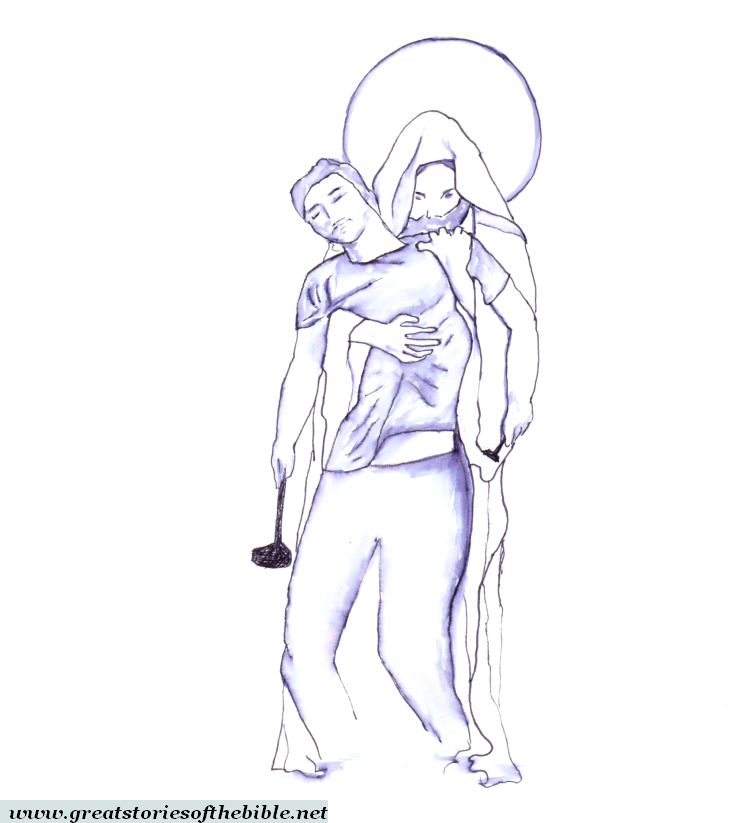Jesus’ Gospel
Priceless love
We leave for a moment Joseph's story to read a Special that meets well the Easter feast day.
The most distinctive feature of the Gospel, the Christian “good news”, is undoubtedly its gratuity. God’s love does not have a price, you do not receive as an award for alleged “merits”, you do not buy it with “good deeds”, it is simply a personalized gift without conditions for every person, who can decide whether to accept it or not.
In the Old Testament the God of Israel proves this by choosing a marginal people, with no political or economic power, with an extremely crude and primitive culture (Egyptians and Babylonians were much more advanced in all these fields). Therefore the reason is not in the receiver of the election, but only in the Donor’s generosity: «The LORD did not set his love on you, nor choose you, because you were more in number than any people; for you were the fewest of all peoples: but because the LORD loves you, and because he would keep the oath which he swore to your fathers» (Deut 7,7-8).
Jesus’ life continues to show that God does not treat people according to their merits, but according to their needs: He loves «first», for no other reason than his own will and without asking anything in return. The shepherds (at the time not well considered persons) and the wise men from the east (not belonging to the Hebrew people and religion) certainly do not deserve to pay homage to the newborn Savior of the world, but God fills them with «exceedingly great joy» (see Matt 2,10). The lepers and the sick in general (for the culture of the time they must have been somehow guilty to explain their illness), the prostitutes, the publicans (greedy and dishonest tax collectors) certainly did not have “merits” before God, but Jesus heals and consoles the first ones and sits at the table with the others (meaning his desire to be in communion with them) because «Those who are healthy have no need for a physician, but those who are sick do. But you go and learn what this means: ’I desire mercy, and not sacrifice,’ for I came not to call the righteous, but sinners» (Matt 9,12-13). To Judas betraying him Jesus answers «Friend, why are you here?» (Matt 26,50), to his disciples that «all» (Matt 26,56) abandoned him when he was captured the Risen manifests calling them «brothers» (see Matt 28,10). St. Paul comments with these words: «For while we were yet weak, at the right time Christ died for the ungodly. For rarely does one die for the righteous. Yet perhaps for a good person someone might dare to die. But God commends his own love toward us, in that while we were yet sinners, Christ died for us» (Rom 5,6-8).

The Gospel is a gift that precedes man’s response; if accepted in life it asks to be cultivated and transmitted to others with the same generosity. In fact those who have experienced God’s generosity and unconditional forgiveness are pushed to treat others as they were first treated by the Lord: «You have heard that it was said, ʽYou shall love your neighbor, and hate your enemy.’ But I tell you, love your enemies, and pray for those who persecute you, that you may be children of your Father who is in heaven. For he makes his sun to rise on the evil and the good, and sends rain on the just and the unjust. [...] Therefore you shall be perfect, as your heavenly Father is perfect» (Matt 5,43-45.48); «Freely you received, freely give» (Matt 10,8).
The Gospel’s gratuity teaches a new humility towards the salvation offered by Jesus: no human work can buy it, it can only be accepted with gratitude in each one’s life, as an undeserved gift, or refused. «Two men went up into the temple to pray; one was a Pharisee, and the other was a tax collector. The Pharisee stood and prayed to himself like this: ʽGod, I thank you, that I am not like the rest of men, extortioners, unrighteous, adulterers, or even like this tax collector. I fast twice a week. I give tithes of all that I get.’ But the tax collector, standing far away, would not even lift up his eyes to heaven, but beat his breast, saying, ʽGod, be merciful to me, a sinner!’ I tell you, this man went down to his house justified rather than the other; for everyone who exalts himself will be humbled, but he who humbles himself will be exalted» (Luke 18,10-14).